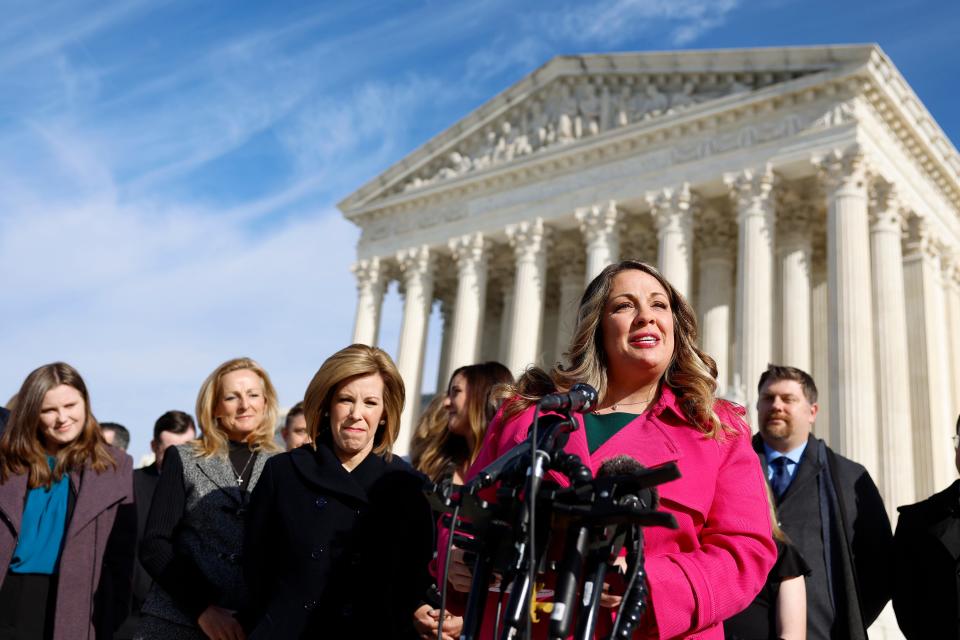Supreme Court has a big question to answer: Why can't government just leave us alone?
In modern American politics, there are two types of people: those who want to control others and those who just want to be left alone.
The second group used to be the more celebrated. Think of the immigrants tired of following orders from their “social betters,” deciding instead to forge a new life and identity in the New World.
When cramped living conditions and factory foremen became too much to bear, these families pushed further west. Some headed to smaller towns in the middle of the country while others formed new communities in the unsettled Mountain West.
It took many years, but the busybodies caught up with those independent types. We’re seeing that today in Colorado.
Lori Smith doesn't support same-sex marriage

Ten years ago, Lorie Smith founded a design studio specializing in graphic and website design. Understandably, she uses her talents to create artwork and messages that she supports. With her Colorado firm 303 Creative, she has supported children with disabilities, overseas missions, animal shelters and veterans.
She also has created websites dedicated to marriage. And this just won’t do.
Another view:Can the government force us to say things we don't believe?
Instead of simply leaving Smith alone, the state tried to force her into creating artwork and messaging with which she disagreed.
Colorado’s Anti-Discrimination Act forbids “any place of business engaged in any sales to the public and any place offering services, facilities, privileges, advantages, or accommodations to the public,” from refusing services based on sexual orientation.
Smith has LGBTQ clients but does not want to promote same-sex marriage since it violates her beliefs. And since there are countless businesses that will create websites, no loving couples will be harmed by simply choosing another vendor. In fact, they’ll likely be happier supporting a designer who agrees with their views.
Why couldn't Colorado leave her alone?
Using the overbroad language of their state law, Colorado could force an atheist to design a church website, a kosher deli to cater a Christian nationalist rally, or a Muslim advertiser to promote a pulled pork barbecue restaurant.
Alternately, the state could just leave its residents alone. But when you want to control what other people do, think, and believe, leaving people alone isn’t an option.
In 2019:The impact of a similar Phoenix wedding invitation case
Colorado isn’t new to this type of activism. In 2019, they lost a Supreme Court case to Jack Phillips, a cakemaker who held similar views against same-sex marriage. The state could no more force Phillips to support a gay wedding than force bakers to design cakes with anti-gay messaging.
Again, there are countless cakeshops enthusiastic to do business with anyone celebrating any type of wedding. Instead, the government targeted Phillips even though no harm befell any customer. The only “harm” was Phillips losing a client.
Supreme Court case has a simple premise
Last week, Colorado found itself back at the Supreme Court, trying to defend their selective persecution of designer Lorie Smith. From the tone of the questioning, the state should expect to lose again.
“Free speech is for everyone. The government can’t force anyone to say something they don’t believe,” 303 Creative’s attorney Kristen Waggoner said. “Lorie’s decision to design a project always turns on what the message is, not who requests it. When she creates a graphic design or website, she communicates a message consistent with her beliefs. And the First Amendment protects every American’s right to express ideas without fear of government punishment.”
The premise of the case is simple: The government should not be able to force you to say things you don’t believe. Americans should be free to express ideas even if the government disagrees with them.
This breaks the other way as well. Those who disagree with Smith or Phillips are free to avoid their businesses and suggest others do the same. No one should be forced to support a message they don’t believe.
A final note to politicians: in our diverse, pluralistic society, the wisest move is usually to just leave people alone.
Jon Gabriel, a Mesa resident, is editor-in-chief of Ricochet.com and a contributor to The Republic and azcentral.com. On Twitter: @exjon.
This article originally appeared on Arizona Republic: Colorado wants to control others. Lorie Smith wants to be left alone

